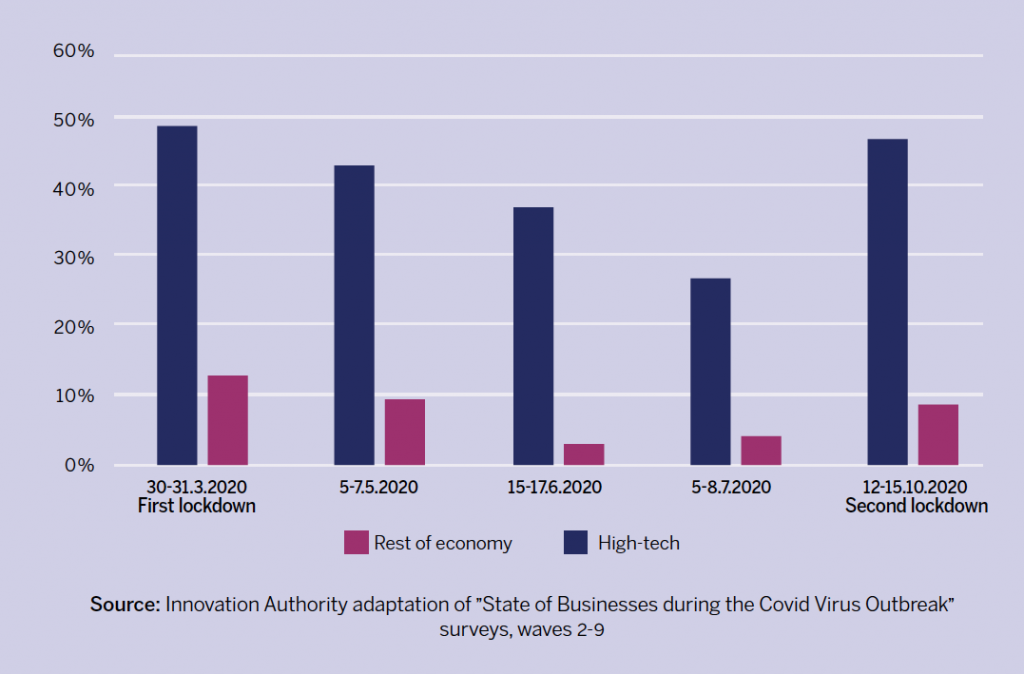One of Covid’s most significant ramifications for the labor market is the transition made by many organizations to working from home, especially during lockdown periods. Prior to Covid, most companies and employers did not allow their employees to work from home, either fully or partially. However, after a period of about a year during which organizations were required to experience this form of work, many are now considering or have already decided to move to a model of hybrid work that combines work in the office and working from home, even after the Covid restrictions are lifted. A positive sign in this direction came from the Wages Commissioner’s Division in the Ministry of Finance and the Civil Service Commission who allow employees in the public sector to work from home one day a week.1Instruction issued by the Civil Service Commissioner is valid for a year subject to performance evaluation.
Rates of Work from Home in High-Tech and Overall Economy

The hybrid work model preserves some of the advantages of working from home highlighted during the Covid period. For example, it allows to reduce traffic on the road and lower air pollution, enables employees to live far from centers of employment, and allows the flexibility needed by parents in the labor market in a way that supports greater gender equality. A transition to the hybrid work model can create new employment opportunities in geographical and social periphery areas, reduce economic and social gaps, and facilitate the integration of people with disabilities. In particular, an experts committee report on a transition to working from home written before the outbreak of Covid with the support of the Ministry of Transport and the Ministry of Environmental Protection found that a public sector transition to working from home for 15% of working hours is expected to benefit the economy by NIS 850 million a year.2See: Implementation of a Working from Home Policy in Israel, Summary and Insights of an Experts Committee, 2020 Nevertheless, it must be remembered that not all sectors of the economy are suited to working from home.3Source: Ability to Work from Home Among Employees in Israel, Taub Center Report, 2020.
With respect to the organizations and the state, the hybrid model creates several managerial challenges related to the creation of new policy. To enable and encourage the adoption of a hybrid work model, the state must be responsible for deploying suitable infrastructure e.g., internet infrastructures must be improved in periphery areas including for 700,000 Arab citizens. Currently, more than a third of Israel’s Arab population lack access to the HOT internet infrastructure. Another issue requiring attention to enable businesses to continue operating while employees work from home, including provision of digital services, is the speed of the internet bit rate in Israel. According to a test conducted by ‘Speedtest’, Israel is positioned in 19th place out of the 37 OECD countries in speed of wired internet networks. According to the findings, the average speed of wired internet in Israel in June 2020 was nearly 100 Mbps, compared to speeds of over 140 Mbps in countries such as Spain, the US, France, Korea, and others.4See: Fixed Internet Infrastructures and Bit Speed on Internet and Periphery Settlements.
In this context, it is worth mentioning a program run jointly by the Ministry of Communications and the Innovation Authority as part of the Innovation Authority’s Pilots Program, to implement advanced communications applications aimed at supporting the expanded use of the G5 network in Israel.5The Pilots Program enables private companies to operate pilot test facilities in a variety of innovation systems, including those that are regulation-intensive and influenced by government, while involving the relevant state entities. This is aimed at increasing the latter’s impact on strengthening innovation systems under their responsibility, providing the private sector with access to regulation, and the public with access to state assets and public infrastructures, and to improve the levels of knowledge and professionalism of the Innovation Authority and the government in advancing these innovation systems. The program awards financial and regulatory support to technology companies conducting pilots at operational work locations and at Ministry of Communications test sites. In particular, the Ministry of Communications allowed technology companies a dedicated regulation framework in which permits for users and frequencies can be received for trials. As part of the program, five pilots are being conducted at test sites with critical infrastructures, such as hospitals and local authorities, that make use of the technology’s unique attributes – the swift supply of data and short delay times.
In addition to addressing the internet infrastructures as a condition for adopting a hybrid work model and preserving Israel’s competitive global position, it must be ensured that the new work model does not create breaches of cyber security. Furthermore, there are also taxation issues related to working from home that must be regulated to enable organizations in Israel to adopt a hybrid work model. For example, tax benefits for work in an area of national priority or questions concerning the recognition of employees’ work-related expenses. All these raise the question as how ready state regulation is to support widespread adoption of a hybrid work model, both in the private and public sectors. Finally, it must be ascertained whether adjustments or training of manpower are needed to enable a long-term change.
